WITNESS RADIO MILESTONES
Unprecedented Wave of “Criminalization” Sweeping the Globe to Silence Indigenous Peoples
Published
7 years agoon
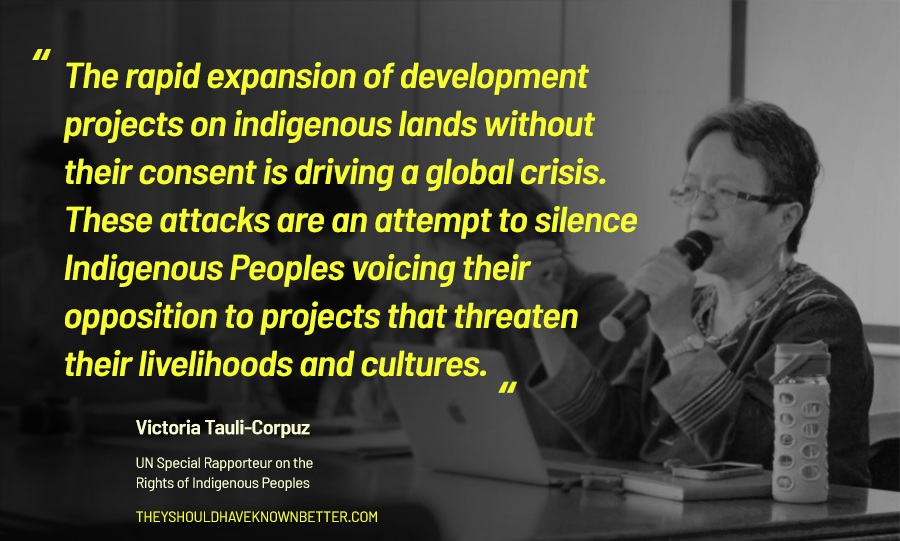
New UN report highlights drastic increase in violence and legal harassment driven by rapid expansion of development projects on indigenous lands
A significant pattern of abuse has emerged in a wide variety of countries, in which both physical violence and legal prosecution are used against Indigenous Peoples defending their rights and lands, according to a new report that UN Special Rapporteur on the Rights of Indigenous Peoples Victoria Tauli-Corpuz submitted to the UN Human Rights Council today.
The report describes how private sector interests collude with governments in coveting the lands of Indigenous Peoples for economic development projects. “Criminalization”—the process of turning those defending their land rights into criminals—has become an increasingly common tool and contributes to how these disputes often transform into open conflicts. While the majority of indigenous individuals who face criminal charges are men, women bear the brunt of their absence as they have to single-handedly assume all responsibilities in their families and communities.
“I’ve been alerted to hundreds of criminalization cases from nearly every corner of the world,” said Tauli-Corpuz. “The rapid expansion of development projects on indigenous lands without their consent is driving a global crisis. These attacks—whether physical or legal—are an attempt to silence Indigenous Peoples voicing their opposition to projects that threaten their livelihoods and cultures.”
Since June 2014, when her tenure as Special Rapporteur began, Tauli-Corpuz has witnessed a significant uptick in cases of criminalization and violence in the Philippines, as well as in Brazil, Colombia, Ecuador, Guatemala, Honduras, India, Kenya, Mexico, and Peru.
Many of the worst violations are driven by rising militarization, national security acts, and anti-terrorism legislation. These can put Indigenous Peoples in the line of fire—literally—of army and police forces. During and shortly after her most recent official country visit to Guatemala in May 2018, seven indigenous leaders were killed. Another activist was murdered just two weeks ago.
“Indigenous leaders in Guatemala who raise their voices face arbitrary detention, torture and sexual harassment from the police, and even murder,” said Aura Lolita Chávez Ixcaquic of the Maya K’iche’ People for the Defense of Life, Mother Nature, Land and Territory. “The justice system not only fails to address our concerns—it is a tool for the state and private interests to attack the authorities and leaders of our communities.”
The Special Rapporteur herself was one of 600 people labeled a terrorist in a legal petition filed in her native Philippines by President Rodrigo Duterte’s government. Although her name and three others were removed from the petition—in the week before her criminalization report was expected to be released—the vast majority of people on the petition remain blacklisted.
Ms. Tauli-Corpuz has noted that the charges were retaliation for her advocacy on behalf of displaced Indigenous Peoples in the Mindanao region of the Philippines, who have faced criminalization and military actions for resisting coal mines and other developments targeting their lands.
“There is widespread impunity for those who commit violence against Indigenous Peoples,” said Anne-Sophie Gindroz, RRI Facilitator for South East Asia. “At the same time, justice systems can be used against indigenous human rights defenders. In Indonesia, for example, people have been arrested for remaining on their land after it was granted to palm oil companies by the government.”
The report notes that violence and criminalization can even extend to lawyers and civil society advocates working with Indigenous Peoples. Gindroz, a longtime indigenous activist, was expelled from the Lao People’s Democratic Republic.
“In 2016, I had to flee my country, and my entire organization went underground,” said Alfred Brownell, founder of Green Advocates, an organization of lawyers, community mobilizers, and women that advocates for the land rights of Liberia’s rural communities and the environment. “These communities are not opposed to development, but they want a say in what happens to the lands they have called home for generations. Some 3 million Liberians depend on customary territories, but their rights are in limbo until we pass vital legislation that has been debated for four years now.”

Across the world, laws are stacked against Indigenous Peoples. A new report from the World Resources Institute finds that the process to formalize indigenous and community land rights is extremely costly and complex, sometimes taking up to 30 years—while companies can typically secure long-term rights to land in as little as 30 days.
While the majority of recorded cases were associated with opposition to business interests, in other instances Indigenous Peoples’ ways of life are deemed illegal in the name of conservation(link is external), leading to arrests, forced evictions, and other human rights violations.
“Conservation has been given as an excuse for escalating violence against the Sengwer Indigenous Peoples living within their ancestral lands in the Embobut forest in Kenya. Some have even been killed,” said Yator Kiptum, Executive Coordinator of the Sengwer Indigenous Peoples Programme. “The Kenyan Forest Service has repeatedly forcefully evicted and burned Sengwer homes and arrested community members—in spite of the fact that the court issued an injunction to prevent such evictions. Sengwer Indigenous Peoples want to live in, govern, manage, and own their ancestral lands working hand in hand with the government and other stakeholders—this is the only way to ensure sustainable conservation of forests. Eviction will only lead to further destruction.”
From defamation to indefinite detention and worse, despite UN treaties
Criminalization typically occurs as part of the government “push back” when Indigenous Peoples oppose large-scale projects. Leaders are targeted as a strategy to suppress and silence entire communities. While the process can vary, it often follows a similar pattern:
- Smear campaigns: Fueled by hate speech based on racism and discrimination, smear tactics and defamation campaigns on social media portray Indigenous Peoples as members of criminal gangs, guerrillas, terrorists, and threats against national security.
- Criminal charges: Indigenous leaders and their communities are often accused of vague charges—such as “perturbation of public order,” “usurpation,” “trespassing,” “conspiracy,” “coercion,” and “instigation of crime.” “States of emergency” are used to suspend judicial guarantees and suppress peaceful protests.
- Arrest Warrants: Warrants are repeatedly issued despite poor evidence and uncorroborated testimony. At times, accusations fail to name people, leaving an entire community accused of a criminal act. Many times, warrants are left pending, unexecuted, leaving the indigenous person affected under a perpetual threat of arrest.
- Illegal shortcuts: The prosecution of indigenous individuals often includes pre-trial detention that can last up to several years, as procedural guarantees are frequently flaunted. Indigenous Peoples seldom have the means to seek legal counsel or even an interpreter. If acquitted, indigenous individuals are rarely awarded remedies.
- Mass criminalization: Indigenous organizations have been subject to illegal surveillance and confiscations while laws imposing registration requirements and funding controls weaken their mobilization and restrict their support. Civil society organizations and lawyers who assist indigenous communities have been physically attacked and even killed.
The report lists a number of international treaties and conventions that provide protections for the rights of Indigenous Peoples and local communities. These agreements include:
- United Nations Declaration on the Rights of Indigenous Peoples (UNDRIP)
- International Covenant on Civil and Political Rights (ICCPR)
- Universal Declaration of Human Rights
- International Labour Organisation Convention on Indigenous and Tribal Peoples No. 169
- International Covenant on Economic, Social and Cultural Rights
- United Nations Framework Convention on Climate Change
- Convention on Biological Diversity
To prepare the report, the Special Rapporteur drew from both primary and secondary sources, information received first-hand during country visits, a public call for submissions, and a two-day expert consultation in Geneva in March 2018. In addition, a consultation meeting with indigenous representatives took place on the side-lines of the Permanent Forum on indigenous issues in April 2018.
Violence continues to add up
Front Line Defenders documented 312 human rights advocates murdered in 2017. Sixty-seven percent were killed for defending their lands, the environment, or indigenous rights, nearly always in the context of private sector projects. Around 80 percent of killings took place in just four countries: Brazil, Colombia, the Philippines and Mexico.
Global Witness documented 207 killings of land and environmental defenders in 2017—the worst year on record—with agribusiness as the industrial sector linked to the most killings. Twenty-five percent of those killed were indigenous.
The failure of states to recognize the land rights of Indigenous Peoples drives this violence, and can lead to them being labeled trespassers in their own homes and evicted from the lands that form the basis of their livelihoods, social cohesion, and spiritual traditions. Indigenous Peoples and local communities customarily claim more than 50 percent of the world’s land but only have legally recognized rights to 10 percent.
“What is happening now across the world is nothing less than a systematic attack on peasant communities and Indigenous Peoples,” said Front Line Defenders Executive Director Andrew Anderson. “In their insatiable greed for wood and oil and gold, corrupt elites, who have no ambition beyond their own enrichment, risk not only destroying the lives and culture of Indigenous Peoples, but also destroying the environment on which our collective future survival depends.”
###
Victoria Tauli-Corpuz (The Philippines), the UN Special Rapporteur on the Rights of Indigenous Peoples(link is external), is an indigenous leader from the Kankana-ey Igorot people of the Cordillera Region in the Philippines. As an indigenous leader, she has worked for over three decades on building movement among indigenous peoples and as an advocate for women’s rights. Tauli-Corpuz is the former Chair of the UN Permanent Forum on Indigenous Issues (2005-2010). She was actively engaged in drafting and adoption of the UN Declaration on the Rights of Indigenous Peoples in 2007.
Related posts:
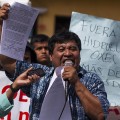
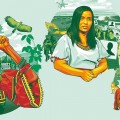 Defending tomorrow: The climate crisis and threats against land and environmental defenders
Defending tomorrow: The climate crisis and threats against land and environmental defenders
 Silence far from golden for child labourers in the mines of Uganda
Silence far from golden for child labourers in the mines of Uganda
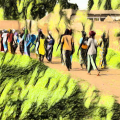 As COVID-19 crisis rages, 119 groups from 30 countries push urgent demands for rural peoples
As COVID-19 crisis rages, 119 groups from 30 countries push urgent demands for rural peoples
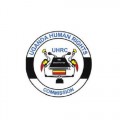 Investigate the criminalization of land rights defenders – witnessradio.org asks National Human Rights Body.
Investigate the criminalization of land rights defenders – witnessradio.org asks National Human Rights Body.
You may like
-


Community land rights defenders that have been on trial since 2020; are set to return to court this January.
-


After being tortured by the army, the land rights defender is charged and remanded to prison
-
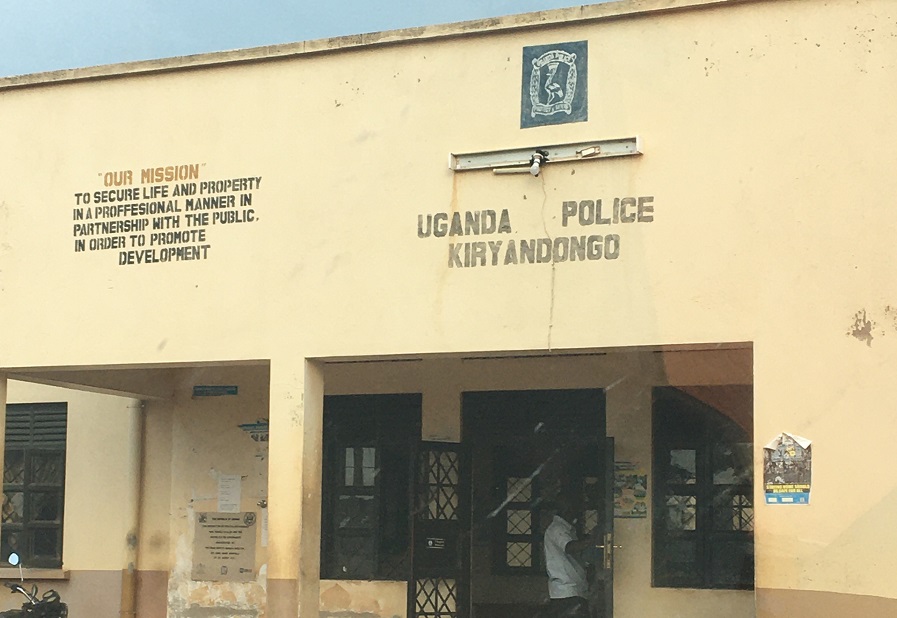

Found! Abducted land rights defender is being held at Kiryandongo district police.
-
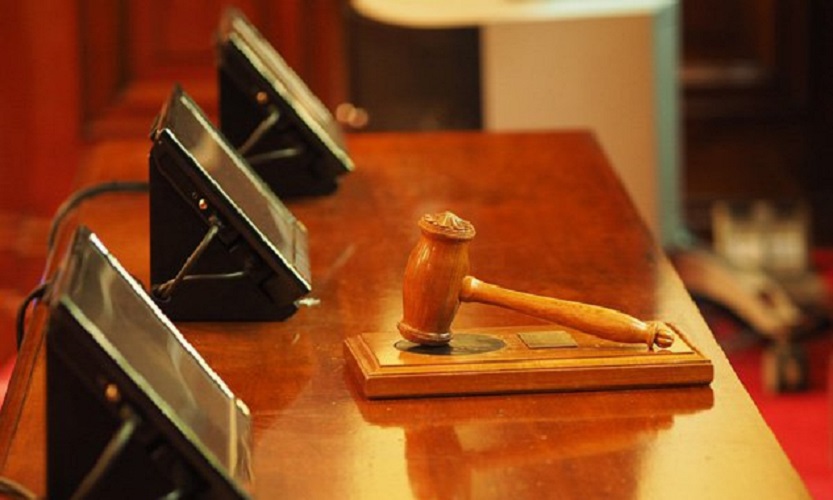

Government ordered to resettle displaced Banyabindi in Kasese
-
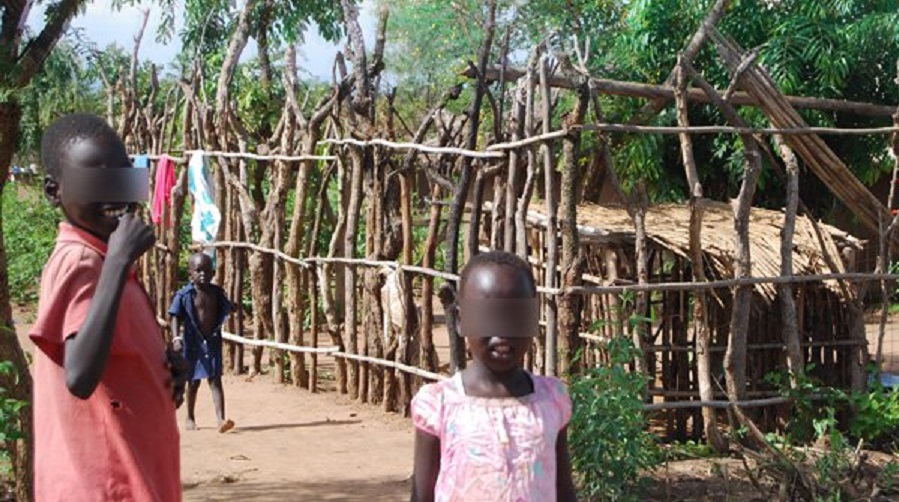

Adjumani officials worry as refugees strip the land bare
-


Court To Determine Whether To Stop An Illegal Eviction Of 3000 People In Mubende
WITNESS RADIO MILESTONES
Top 10 agribusiness giants: corporate concentration in food & farming in 2025
Published
3 weeks agoon
June 19, 2025
Today a handful of agribusiness corporations have consolidated unprecedented control over the world’s food supply, with devastating consequences for farmers, consumers and the planet. A new report by ETC Group and GRAIN examines the state of corporate concentration in six sectors critical to agriculture: commercial seeds, pesticides, synthetic fertilisers, farm machinery, animal pharmaceuticals and livestock genetics.
Corporate consolidation is increasing in most of these sectors and four of them– seeds, pesticides, agricultural machinery and animal pharmaceuticals– now meet the definition of an oligopoly, in which four companies control more than 40% of a market. Concentration can be even higher at the national level, as is the case with synthetic fertilisers.
Top findings from the report include:
- Oligopolies dominate key sectors: Bayer, Corteva, Syngenta, and BASF control 56% of the global commercial seeds market, and 61% of the pesticides market.
- Profiteering amid global crises: Agribusiness giants have exploited crises like the Ukraine war and the COVID-19 pandemic to inflate prices. Fertiliser companies, for instance, saw revenues soar by 57% from 2020 to 2023, with some accused of price gouging.
- Digital and biotech expansion: Corporations are rapidly integrating AI, gene editing, and digital platforms into agriculture through partnerships with Big Tech companies. These technologies enable data extraction from farmers, facilitate carbon credit schemes, and tighter control over food systems—while raising concerns about biosafety, privacy, and corporate monopolies.
Source: grassrootsonline
Related posts:

 A corporate cartel fertilises food inflation
A corporate cartel fertilises food inflation
 Food inflation: The math doesn’t add up without factoring in corporate power
Food inflation: The math doesn’t add up without factoring in corporate power
 African governments are giving in to corporate pressure and undermining local seed systems – report
African governments are giving in to corporate pressure and undermining local seed systems – report
 The United Nations Food Systems Summit is a corporate food summit —not a “people’s” food summit
The United Nations Food Systems Summit is a corporate food summit —not a “people’s” food summit
WITNESS RADIO MILESTONES
Land grabbers evict 360,000 Ugandans in 2024
Published
8 months agoon
November 20, 2024
A staggering 363,021 Ugandans were displaced due to forced land evictions between January and June 2024, according to a new report by Witness Radio Uganda.
The report documented 90 cases of land evictions during this period, with nearly four incidents occurring weekly, affecting over 15,126 people and threatening 5,060 hectares of land nationwide.
The Central region was the epicenter, recording 52 eviction cases, followed by 24 in the Western region, eight in the Northern region, and six in the Eastern region. Alarmingly, the report estimated that 2,160 Ugandans face eviction daily, with 723 hectares of land at risk of being grabbed every day.
VIOLENCE AND HUMAN RIGHTS VIOLATIONS
Despite government promises and directives from President Museveni to halt evictions, land grabbers have routinely ignored these orders, often resorting to violence. Armed security forces, private militias, and police were reported to have carried out the majority of the evictions.
Of the reported cases, 37 were enforced by armed gangs on behalf of evictors, 25 involved Uganda Police, five were carried out with the participation of UPDF soldiers, and four were linked to private security companies.
“The egregious levels of impunity exhibited by land grabbers have left communities defenseless, creating an environment where their human rights are trampled without consequence,” said Jeff Wokulira Ssebaggala, country director of Witness Radio Uganda.
He called for accountability and justice, warning that the unchecked power of influential individuals and entities leaves marginalized communities vulnerable and without recourse.
DRIVERS OF EVICTIONS: INDUSTRIALIZATION AND LAND-BASED INVESTMENTS
The report identified the government’s push for industrialization and land-based investments as the primary drivers of forced evictions. Land is increasingly targeted for oil and gas extraction, mining, agribusiness and tree plantations for carbon offsets. While some of this land is already under development, other parcels remain vacant but are guarded by military personnel and private security firms.
Ssebaggala emphasized that industrialization must balance economic development with the protection of smallholder farmers’ rights to land and food security.

TRAGIC STORIES
The report highlighted harrowing cases that underscore the human toll of forced evictions. In Nakasongola, smallholder farmer Dan Ssebyala was ambushed and killed by armed men following a confrontation over disputed land. The district has become a hotspot for violent evictions involving absentee landlords and powerful investors.
Ismael Bwowe, a disabled father of 20, recounted how his land was confiscated after he demanded fair compensation. He faced intimidation, arrests and false charges from state authorities, including being accused of robbing an influential individual. Bwowe claimed that Total Energies offered legal support and representation on the condition that he accept their compensation terms.
“I refused,” he said, adding that the pressure to relinquish his land remains intense. The report underscores the urgent need for reforms to address forced evictions, ensure accountability, and protect the rights of vulnerable communities. Without meaningful intervention, Uganda risks deepening inequality and undermining the livelihoods of smallholder farmers who are essential to the country’s food security.
FAMILY JAILED AMID LAND DISPUTE
The plight of Richard Ssebagala, his wife Prossy Namande, and their relative Anania Ngabirano, residents of Kabubu-Kabongo village in Nansana Municipality, Wakiso district, highlights the human toll of Uganda’s ongoing land disputes. The family spent nine months in prison following their arrest on January 10, 2024, under controversial circumstances.
ARREST AND ALLEGATIONS
The arrests occurred at 1am, during a raid by officers from Luweero police station. Police reportedly banged on the doors and forcefully detained the family, accusing them of aggravated robbery. However, the family believes the arrest was a tactic linked to a land dispute with Benon Ntambi, a man who allegedly grabbed their land.
Before the arrests, Ntambi had reportedly destroyed crops, including tomatoes, potatoes, and bananas, on the contested land. While the family was incarcerated, a new building was constructed on their land, which is now occupied, raising further questions about the motivations behind their detention.
CALLS FOR JUSTICE
The case has drawn attention from Witness Radio Uganda, which has urged the government to take immediate action to address land grabbing and illegal evictions. The organization emphasized the need to strengthen land laws and protect vulnerable communities from abuses.
It also called for greater accountability in institutions such as the Uganda Police Force, the army and land registries, which are often accused of corruption and favoritism toward the wealthy.
“The government must prioritize justice for victims of illegal evictions and address systemic corruption that leaves the poor defenseless against land grabbers,” Witness Radio Uganda stated.
BROADER CONTEXT
This case underscores the broader issue of land conflicts in Uganda, where vulnerable families are often caught in disputes with powerful individuals or entities. Advocacy groups warn that the failure to address these issues not only erodes public trust but also perpetuates inequality and injustice.
As the government faces mounting pressure to act, the story of Ssebagala and his family serves as a stark reminder of the urgent need for reforms to protect land rights and ensure justice for those impacted by land disputes.
Source: The Observer
Related posts:

 Local land grabbers evict villagers at night; foreign investors cultivate the same lands the next day
Local land grabbers evict villagers at night; foreign investors cultivate the same lands the next day
 Uganda: Land-grab victim communities will join counterparts in commemorating the 2024 International Day of Struggle Against Industrial Plantations.
Uganda: Land-grab victim communities will join counterparts in commemorating the 2024 International Day of Struggle Against Industrial Plantations.
 Mubende Land Grab: Witnessradio.org presents another petition to Land Inquiry Commission, Wants All Titles being used to evict Natives to be Investigated
Mubende Land Grab: Witnessradio.org presents another petition to Land Inquiry Commission, Wants All Titles being used to evict Natives to be Investigated
 A Nullity? Ugandans Query Constitutional Land Amendment Bill
A Nullity? Ugandans Query Constitutional Land Amendment Bill
WITNESS RADIO MILESTONES
Uganda: Community members violently evicted by security forces, allegedly related to EACOP; incl. co. responses
Published
8 months agoon
November 18, 2024
On 10 February 2023, more than 2,500 community members were forcibly evicted from their land in Kapapi village in Hoima district in Western Uganda by security forces, receiving no compensation or resettlement.
Witness Radio, an Ugandan non-profit organisation comprised of human rights investigative journalists, lawyers, and social workers, said that many people were wounded during the eviction, women were raped, and houses were destroyed.
Witness Radio said its investigations found that this eviction occurred to clear the path for the Tilenga feeder pipeline, part of the East African Crude Oil Pipeline (EACOP). According to Witness Radio, in 2022 Kapapi community members’ land was surveyed for the Tilenga pipeline and people were informed they would be compensated for the land. Instead, they were forcibly evicted, which Witness Radio allege was backed and financed by Swacoff Intertrade Company Limited, known to TotalEnergies. They also allege that guards from private security company Magnum Security were involved. Witness Radio has also found that dozens of local farmers who were evicted have been arbitrarily arrested and face criminal charges.
The Business & Human Rights Resource Centre invited TotalEnergies, Swacoff Intertrade Company Limited, and Magnum Security to respond to the allegations. TotalEnergies responded and stated that no land eviction activities had been carried out by or on behalf of TotalEnergies EP Uganda (TEPU) and EACOP Ltd and that none of the affected people are Tilenga or EACOP Project Affected Persons. Swacoff responded and said that the company has never engaged in forceful eviction of any sort and asserts that these allegations are completely false. Their full responses and rejoinders from Witness Radio are available below. Magnum Security did not respond.
Related posts:

 Uganda: NGO claims Agilis Partners & Great Seasons violently evicted locals to pave the way for agribusiness; Agilis Partners responds
Uganda: NGO claims Agilis Partners & Great Seasons violently evicted locals to pave the way for agribusiness; Agilis Partners responds
 A son of the community defender is shot dead, another critically injured in a retaliatory attack by security guards evicting locals off their land to give way to large-scale sugarcane growing.
A son of the community defender is shot dead, another critically injured in a retaliatory attack by security guards evicting locals off their land to give way to large-scale sugarcane growing.
 Breaking: Criminal trial for seven community defenders opposed to EACOP/Tilenga project forced land eviction has been fixed.
Breaking: Criminal trial for seven community defenders opposed to EACOP/Tilenga project forced land eviction has been fixed.
 Uganda: CSOs claim Agilis Partners forcibly evicting local communities to pave way for agribusiness; company did not respond
Uganda: CSOs claim Agilis Partners forcibly evicting local communities to pave way for agribusiness; company did not respond

Land Grabbing Crisis Escalates in Uganda: Mayiga Urges Citizens to Secure Land Documents

Seizing the Jubilee moment: Cancel the debt to unlock Africa’s clean energy future

Activism on Trial: Despite the increasing repressive measures, Uganda’s EACOP protesters are achieving unexpected victories in the country’s justice systems.

Communities Under Siege: New Report Reveals World Bank Failures in Safeguard Compliance and Human Rights Oversight in Tanzania

A decade of displacement: How Uganda’s Oil refinery victims are dying before realizing justice as EACOP secures financial backing to further significant environmental harm.

Govt launches Central Account for Busuulu to protect tenants from evictions

Activism on Trial: Despite the increasing repressive measures, Uganda’s EACOP protesters are achieving unexpected victories in the country’s justice systems.

Top 10 agribusiness giants: corporate concentration in food & farming in 2025

Innovative Finance from Canada projects positive impact on local communities.
Over 5000 Indigenous Communities evicted in Kiryandongo District
Petition To Land Inquiry Commission Over Human Rights In Kiryandongo District
Invisible victims of Uganda Land Grabs
Resource Center
- LAND GRABS AT GUNPOINT REPORT IN KIRYANDONGO DISTRICT
- RESEARCH BRIEF -TOURISM POTENTIAL OF GREATER MASAKA -MARCH 2025
- The Mouila Declaration of the Informal Alliance against the Expansion of Industrial Monocultures
- FORCED LAND EVICTIONS IN UGANDA TRENDS RIGHTS OF DEFENDERS IMPACT AND CALL FOR ACTION
- 12 KEY DEMANDS FROM CSOS TO WORLD LEADERS AT THE OPENING OF COP16 IN SAUDI ARABIA
- PRESENDIANTIAL DIRECTIVE BANNING ALL LAND EVICTIONS IN UGANDA
- FROM LAND GRABBERS TO CARBON COWBOYS A NEW SCRAMBLE FOR COMMUNITY LANDS TAKES OFF
- African Faith Leaders Demand Reparations From The Gates Foundation.
Legal Framework
READ BY CATEGORY
Newsletter
Trending
-

 SPECIAL REPORTS AND PROJECTS5 days ago
SPECIAL REPORTS AND PROJECTS5 days agoActivism on Trial: Despite the increasing repressive measures, Uganda’s EACOP protesters are achieving unexpected victories in the country’s justice systems.
-

 NGO WORK2 weeks ago
NGO WORK2 weeks agoCommunities Under Siege: New Report Reveals World Bank Failures in Safeguard Compliance and Human Rights Oversight in Tanzania
-

 SPECIAL REPORTS AND PROJECTS1 day ago
SPECIAL REPORTS AND PROJECTS1 day agoSeizing the Jubilee moment: Cancel the debt to unlock Africa’s clean energy future
-

 MEDIA FOR CHANGE NETWORK1 day ago
MEDIA FOR CHANGE NETWORK1 day agoLand Grabbing Crisis Escalates in Uganda: Mayiga Urges Citizens to Secure Land Documents
